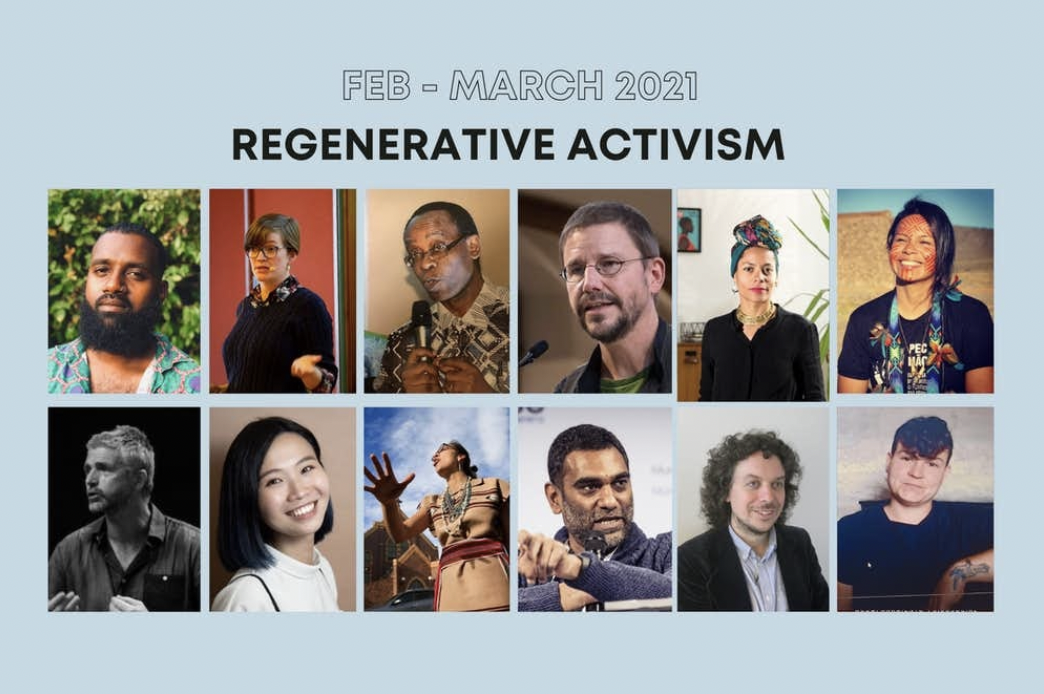For the fourth year running the Ulex Project collaborated with Advaya and Gita Parihar to offer the Regenerative Activism conference, this time focussed on the theme of Building and Sustaining Our Movements.
Over a five week period, from 24 February to 21 March 2021, hundreds of people tuned in around the world to participate in a range of critical conversations and a half day workshop exploring the transformative power of social movements.

Thanks to everyone who attended, and we look forward to seeing you again next year! Here is a summary of each of the sessions with links to recordings and speaker’s info:
WEEK ONE: FACING REPRESSION & BUILDING MOVEMENT RESILIENCE
Hosted by G from Ulex Project with Ilaj (LGBTQI+ psycho-social resilience trainer at Ulex), Glacier Kwong (Hong Kong pro-democracy activist in exile) and Laurence Cox (author of Why Social Movements Matter and Director of the MA in Social Activism at the University of Maynooth Ireland).
Dialogue 1: This session dwelt on the experiences of people working across diverse contemporary movements, as well as looking at some of the lessons we can learn from history. We heard about the challenges faced by pro-democracy organisers in Hong Kong over recent years, and explored the experience of LGBTQI+ movements across Central and Eastern Europe facing harsh repression. We learnt about how different systems construct consent for repressive violence or find ways to conceal movement suppression within the mechanisms of social reproduction and what this means for our organising.
To find out more about the speakers, their work and trainings, please visit the sites here:
The aims of the training are to:
• Ilaj: LGBTQI+ Resilience, Ulex Project
• Glacier Kwong: Hong Kong Democracy Council
• Laurence Cox: Personal website: Learning From Each Other’s Struggles
• G: Ulex Project – Courses & Events
WEEK TWO: ROUTES OF RESISTANCE : NARRATIVE, CULTURE & POWER
Hosted by Christabel from Advaya with Emilia Roig (founder of the Center for Intersectional Justice), Lyla June Johnston (poet, singer-songwriter and community organizer of Diné (Navajo), Tsétsêhéstâhese (Cheyenne) and European lineages) & Joshua Virasami (organiser, artist and author of How To Change It: Make A Difference).
Dialogue 2: This session explored how movement building involves the development of narratives and the construction of empowering identities, and asked how identities which grow out of our past can continue to evolve as we generate and envision new social relations. As Stuart Hall has said, instead of thinking about “people‘s roots, we ought to think about what are their routes, the different points by which they have come to be now; they are, in a sense, the sum of those differences.” These issues were discussed in relation to the politics of British Black identity, relationship to heritage and tradition in indigenous organising, and current challenges within decolonial and antiracist movement building today.
To find out more about the speakers, their work and trainings, please visit the sites here:
• Joshua Virasami: Book: How To Change It: Make A Difference
• Emilia Roig: Events, media & more: Centre for Intersectional Justice
• Lyla June Johnston: Music, writing, podcasts, events: Personal Website
• Christabel Rose: Advaya
WEEK THREE: GLOBAL MOVEMENTS: POWER, RESOURCES & RESILIENCE
Hosted by Gita Parihar with Kumi Naidoo (Human Rights and Environmental Justice Campaigner, Founding Chair of the Campaign for a Just Energy Future), Nnimmo Bassey (artist, activist and author of To Cook A Continent: Destructive Extraction and Climate Change in Africa), and Silje Lundberg (community organiser, President of Friends of the Earth Norway).
Dialogue 3: This session explored the multi-layered response of global environmental movements to the complex series of threats that affect all who inhabit this planet. We discussed questions of power, money and resource in movement-building, looking at differences between the global north and south, as well as professional and volunteer activist spaces. We considered sources of and responses to burnout and the distinct contribution of youth activism.
To find out more about the speakers, their work and trainings, please visit the sites here:
• Kumi Naidoo: https://twitter.com/kuminaidoo
• Nnimmo Bassey: https://twitter.com/NnimmoB
• Silje Lundberg: https://twitter.com/siljelundberg
WEEK FOUR: PSYCHOSOCIAL PRACTICES FOR SUSTAINING OUR MOVEMENTS
Hosted by G from Ulex Project with Daiara Tukano (indigenous activist and artist of Tukano indigenous nation of the Upper Rio Negro), Stefania Grasso (Advocacy Officer at Aluna Acompañamiento Psicosocial, Mexico) and Peter Steudtner (human rights activist, documentary film-maker and trainer for nonviolent conflict transformation.)
Dialogue 4: In this session we talked with practitioners who have developed holistic frameworks that recognise the interplay between the individual, group and socio-political levels of activist practice. In Mexico, Aluna uses a model of psychosocial accompaniment based on ‘liberation psychology’ to support victims of political violence. Peter Steudtner was one of the authors of the Holistic Security Manual, that offers integrated methods of analysis and strategy to deal with psychosocial, physical and digital threats. Daiara Tukano brings her experience of facing these challenges as an artist and researcher in human rights focused on independent communication within the indigenous movement.
To find out more about the speakers, their work and trainings, please visit the sites here:
• Peter Steudtner: Holistic Security
• Stefania Grasso: Aluna website in English / The Book: Modelo de Acompañamiento Psicosocial ALUNA
• Daiara Tukano: Personal Website
Thanks to everyone who helped create the 2021 series, and we look forward to seeing you again next year! To stay posted on the 2022 event sign up for our newsletter.
READ ON: 8 Resilience Trainers Offer Their Top Tips »»»